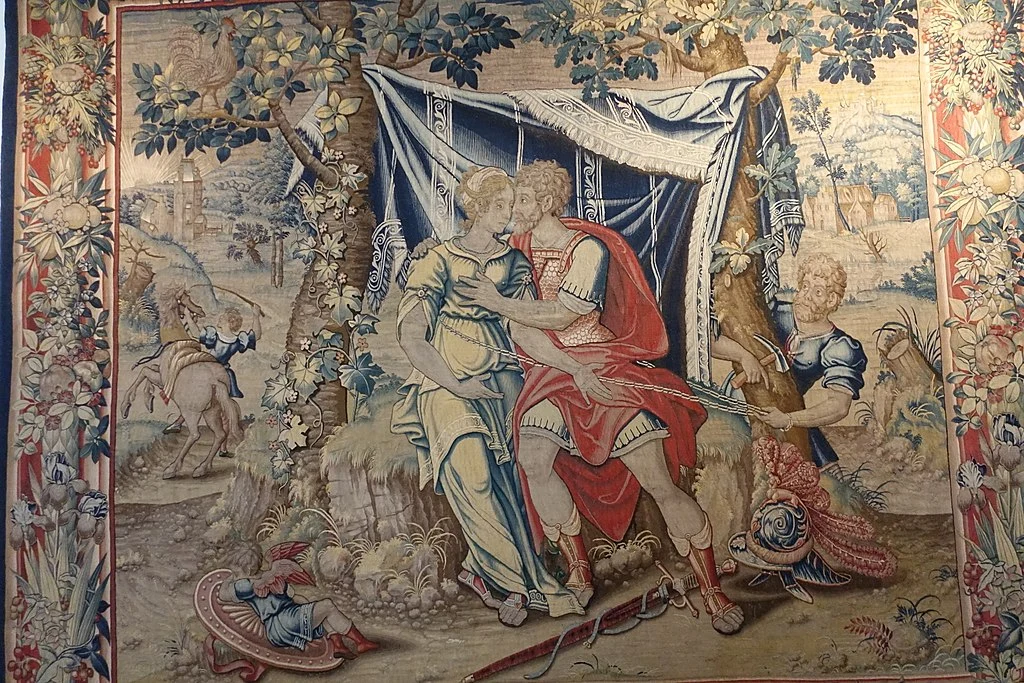The myth of Aphrodite and Ares is an iconic tale in Greek mythology, that delves into the entangled lives of various Greek Gods. Amidst Aphrodite’s several extramarital affairs, the tale of her falling passionately for Ares, the dashing god of war, is the most popular.

The Characters
Aphrodite: She was an Olympian deity, who embodied love, beauty, pleasure, and procreation. Aphrodite’s birth near Cyprus was linked to the severed genitalia of Uranus, the sky god. Beyond her conventional role as a love goddess, Aphrodite held a broader importance. She was often portrayed as a stunning woman, frequently accompanied by the winged deity Eros.
Ares: The Olympian deity, Ares represented war, battle fervor, bravery, and social harmony. He symbolized raw violence and fierceness. Ares engaged in an illicit romance with Aphrodite, but their affair was exposed by her husband Hephaestus, who trapped them in a golden net and summoned the gods to witness their humiliation.
Hephaestus: He was an Olympian deity, who presided over fire, smithing, craftsmanship, metalwork, stonemasonry, and sculpture. Born to Zeus and Hera, he was wed to Aphrodite by Zeus himself, averting a potential divine conflict for her affection. Renowned as a god of smithing, he skillfully forged weapons for Olympus and served as the gods’ blacksmith.
The Beginning of the Myth
The tale of Aphrodite and Ares stands as a captivating episode within Greek mythology, rich with intricate dynamics. At its heart lies Aphrodite, the goddess of beauty and sexual love, who emerged in unparalleled splendor from the sea. Her extraordinary beauty enchanted all, immortal and mortal alike, cultivating a sense of vanity that would define her character.
In stark contrast, Hephaestus, the god of fire, forge, and craftsmanship, harbored a concealed affection for Aphrodite. His demeanor, unlike hers, was marked by ingratitude, owing to his unfortunate appearance and painful rejection by his own mother. Born disfigured and hunchbacked, he bore the scars of his mother Hera’s displeasure, for she found his appearance unseemly and cast him out from Olympus when he was a baby.
Fuelled by this profound hurt, Hephaestus devised a cunning scheme of revenge. Within his ingenious workshop, he meticulously built a bewitched throne and tricked Hera to sit on it. Unbeknownst to her, the throne ensnared her upon sitting, leaving her trapped.
Marriage of Aphrodite And Hephaestus
The intriguing myth of Aphrodite and Ares unfolds with Hera, trapped by Hephaestus’ throne, beseeching and pleading for her release. In exchange for her freedom, Hephaestus proposed a singular condition: the hand of Aphrodite in marriage. Zeus agreed to negotiate the marriage price and Aphrodite was married off to Hephaestus.
Yet, this marriage bore a bittersweet flavor. Aphrodite, the goddess of beauty, found herself trapped in a union with the disfigured and ugly Hephaestus, a stark contrast to her own ethereal grace. Her disdain for Hephaestus simmered, stemming from his inability to match her exquisite beauty.
Undeterred, Hephaestus strove to win Aphrodite’s love, crafting intricate jewelry that mirrored her beauty within his workshop’s fiery depths. His sincere efforts, however, met cold indifference from the goddess, who committed adultery with mortals and other gods.
The Love Affair of Aphrodite and Ares
Enter Ares, the dashing god of war, virility, and defender of the vulnerable. In striking contrast to Hephaestus, he was handsome and charismatic. Ares, born of Hera and Zeus, possessed an irresistible charm, along with a soft spot for goddesses and mortal women alike. Unlike his diligent half-brother, Ares did not have to put in a lot of effort to be with women; his mere presence was enough for them willing to surrender.
In the captivating tale of Aphrodite and Ares, the god of war found himself madly drawn by an overwhelming passion upon encountering the goddess of beauty. Unlike his usual conquests, Ares resolved to woo her genuinely, employing gifts and ceaseless admiration in his quest for her affection. As their companionship deepened, so did Aphrodite’s response, eventually succumbing to Ares’ ardent advances.
Meanwhile, Aphrodite’s husband, Hephaestus, often remained too engrossed in his works in his workshop during the night. This circumstance provided a perfect cover for the secret lovers to indulge their affection under the veil of nightfall, only stopping when Alectryon, a vigilant young attendant, signaled the approach of dawn, heralded by the watchful Helios.
For the ancient Greeks, divine liaisons were not uncommon, yet the rules of love bore their own complexities. While gods and goddesses freely engaged in various love affairs, committing exclusively to one partner was considered a breach of convention – formal infidelity. Aphrodite and Ares, their passion veiled by necessity, epitomized this intricate dance between desire and societal norms.
The Punishment
The passionate love affair of Aphrodite and Ares took an unexpected turn due to a momentary lapse. Alectryon, the watchful guardian, wearied by his monotonous work, inadvertently dozed off, failing to signal the arrival of Helios. As dawn broke, Helios, the all-seeing Sun, unveiled the lovers entwined beneath the same sheets that once cradled Aphrodite with Hephaestus. Overwhelmed with anger, Helios rushed to Hephaestus, revealing the affair in vivid detail.
Deeply wounded, Hephaestus’ heartache transformed into a thirst for vengeance. Designing an intricate trap, he meticulously wove a net of golden threads – exquisitely delicate yet astonishingly robust. With the net discreetly draped across the lovers’ bed, Hephaestus departed on a journey. Seizing the opportunity, Ares hastened to Aphrodite’s side, ignorant of the impending snare.
As Aphrodite and Ares lay down on the bed, the golden threads cascaded upon them, trapping the oblivious couple. Hephaestus, swift in his return, summoned the entire divine assembly of the Olympian gods to witness the spectacle. Laughter echoed among the gods, as the absurdity of the situation stretched into what felt like eternity.
Following this comical revelation, the entangled lovers were liberated, and condemned to separate paths. Aphrodite fled to the island of Paphos until Hephaestus forgave her. Ares punished Alectryon for his mistake, transforming him into a vigilant rooster, doomed to herald the Sun’s arrival with his crowing – an eternal reminder of his accidental blunder. Thus, the myth of Aphrodite and Ares weaves a tale of desire, deception, and divine reprisal within the rich literature of Greek mythology.
The Son of Aphrodite and Ares – Eros
The god of romantic love, Eros, was the son of the love affair of Ares and Aphrodite. Although the two lovers were not allowed to see each other again, they broke the rule and had seven more children.
Were Aphrodite and Ares Siblings
Ares was the son of Zeus and his wife Hera, the goddess of marriage. Aphrodite on the other hand had an unusual birth, rising from the ocean after the castration of Uranus. In some myths, Zeus was the father of Aphrodite, while in others he was a father figure but not her genetic father. Therefore, Aphrodite and Ares can be considered to be half-siblings.
Summary
The intriguing myth of Aphrodite and Ares, a captivating tale within Greek mythology, revolves around Aphrodite’s embodiment of beauty and s*xual love, emerging enchantingly from the sea. The sight of Aphrodite entranced gods and mortals, igniting her vanity.
In stark contrast, Hephaestus, the god of fire and craftsmanship, secretly harbored unrequited affection for Aphrodite, born from Hera’s disdain. This narrative unfolds with Hephaestus ingeniously ensnaring Hera, seeking Aphrodite’s hand in return for her release. The ensuing marriage is marred by Aphrodite’s infidelity, entwining her fate with Ares, the handsome god of war. A relentless courtship ensues, contrasting Hephaestus’ futile advances with Ares’ pursuit.
Under the vigilant watch of Alectryon, Ares and Aphrodite’s romance thrived, veiled by secrecy, until a fateful slumber unveiled their affair to Helios. This revelation triggered Hephaestus’ ingenious revenge – a nearly invisible net, capturing the lovers in their intimacy. The ensuing divine spectacle led to their release, Alectryon’s transformation into a rooster, and the birth of Eros.
Also Read: The Tale of Adonis and Aphrodite
